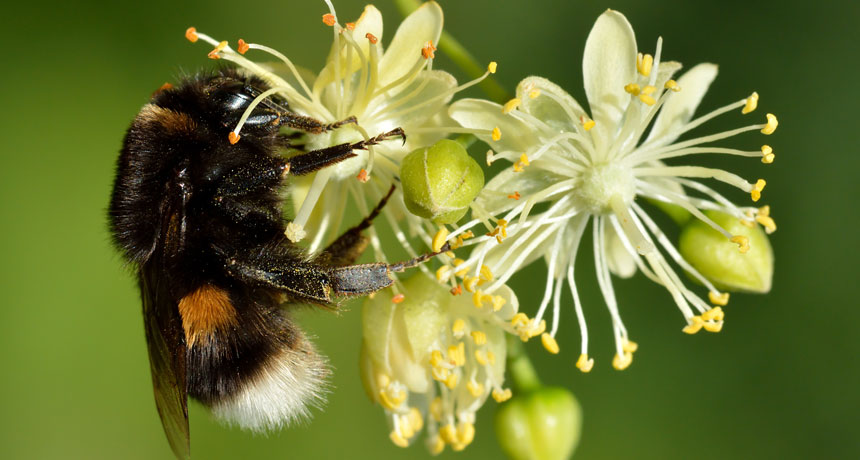Primitive signs of emotions spotted in sugar-buzzed bumblebees

To human observers, bumblebees sipping nectar from flowers appear cheerful. It turns out that the insects may actually enjoy their work. A new study suggests that bees experience a “happy” buzz after receiving a sugary snack, although it’s probably not the same joy that humans experience chomping on a candy bar.
Scientists can’t ask bees or other animals how they feel. Instead, researchers must look for signs of positive or negative emotions in an animal’s decision making or behavior, says Clint Perry, a neuroethologist at Queen Mary University of London. In one such study, for example, scientists shook bees vigorously in a machine for 60 seconds — hard enough to annoy, but not hard enough to cause injury — and found that stressed bees made more pessimistic decisions while foraging for food.
The new study, published in the Sept. 30 Science, is the first to look for signs of positive bias in bee decision making, Perry says. His team trained 24 bees to navigate a small arena connected to a plastic tunnel. When the tunnel was marked with a blue “flower” (a placard), the bees learned that a tasty vial of sugar water awaited them at its end. When a green “flower” was present, there was no reward. Once the bees learned the difference, the scientists threw the bees a curveball: Rather than being blue or green, the “flower” had a confusing blue-green hue.
Faced with the ambiguous color, the bees appeared to dither, meandering around for roughly 100 seconds before deciding whether to enter the tunnel. Some didn’t enter at all. But when the scientists gave half the bees a treat — a drop of concentrated sugar water — that group spent just 50 seconds circling the entrance before deciding to check it out. Overall, the two groups flew roughly the same distances at the same speeds, suggesting that the group that had gotten a treat first had not simply experienced a boost in energy from the sugar, but were in a more positive, optimistic state, Perry says.
In a separate experiment, Perry and colleagues simulated a spider attack on the bees by engineering a tiny arm that darted out and immobilized them with a sponge. Sugar-free bees took about 50 seconds longer than treated bees to resume foraging after the harrowing encounter.
The researchers then applied a solution to the bees’ thoraxes that blocked the action of dopamine, one of several chemicals that transmit rewarding signals in the insect brain. With dopamine blocked, the effects of the sugar treat disappeared, further suggesting that a change in mood, and not just increased energy, was responsible for the bees’ behavior.
The results provide the first evidence for positive, emotion-like states in bees, says Ralph Adolphs, a neuroscientist at Caltech. Yet he suspects that the metabolic effects of sugar did influence the bees’ behavior.
Geraldine Wright, a neuroethologist at Newcastle University in England, shares that concern. “The data reported in the paper doesn’t quite convince me that eating sucrose didn’t change how they behaved, even though they say it didn’t affect flight time or speed of flight,” she says. “I would be very cautious in interpreting the responses of bees in this assay as a positive emotional state.”